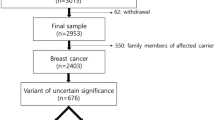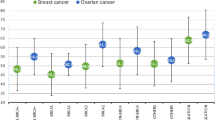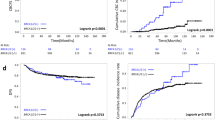Abstract
The widely used Western BRCA mutation prediction models underestimated the risk of having a BRCA mutation in Korean breast cancer patients. This study aimed to identify predictive factors for BRCA1/2 mutations and to develop a Korean BRCA risk calculator. The model was constructed by logistic regression model, and it was based on the Korean Hereditary Breast Cancer study, in which 1669 female patients were enrolled between May 2007 and December 2010. A separate data set of 402 patients, who were enrolled from Jan 2011 to August 2012, was used to test the performance of our model. In total, 264 (15.8%) and 67 (16.7%) BRCA mutation carriers were identified in the model and validation set, respectively. Multivariate analysis showed that age at breast cancer diagnosis, bilateral breast cancer, triple-negative breast cancer (TNBC) and the number of relatives with breast or ovarian cancer within third-degree relatives were independent predictors of the BRCA mutation among familial breast cancer patients. An age <35 years at diagnosis, bilateral breast cancer, both breast and ovarian cancer and TNBC remained significant predictors in non-familial breast cancer cases. Our model was developed based on logistic regression models. The validation results showed no differences between the observed and expected carrier probabilities. This model will be a useful tool for providing genetic risk assessments in Korean populations.
Similar content being viewed by others
Log in or create a free account to read this content
Gain free access to this article, as well as selected content from this journal and more on nature.com
or
References
Miki, Y., Swensen, J., Shattuck-Eidens, D., Futreal, P. A., Harshman, K., Tavtigian, S. et al. A strong candidate for the breast and ovarian cancer susceptibility gene BRCA1. Science 266, 66–71 (1994).
Wooster, R., Bignell, G., Lancaster, J., Swift, S., Seal, S., Mangion, J. et al. Identification of the breast cancer susceptibility gene BRCA2. Nature 378, 789–792 (1995).
Meijers-Heijboer, H., van den Ouweland, A., Klijn, J., Wasielewski, M., de Snoo, A., Oldenburg, R. et al. Low-penetrance susceptibility to breast cancer due to CHEK2(*)1100delC in noncarriers of BRCA1 or BRCA2 mutations. Nat. Genet. 31, 55–59 (2002).
Swift, M., Morrell, D., Massey, R. B. & Chase, C. L. Incidence of cancer in 161 families affected by ataxia-telangiectasia. N. Engl. J. Med. 325, 1831–1836 (1991).
Malkin, D., Li, F. P., Strong, L. C., Fraumeni, J. F. Jr., Nelson, C. E., Kim, D. H. et al. Germ line p53 mutations in a familial syndrome of breast cancer, sarcomas, and other neoplasms. Science 250, 1233–1238 (1990).
Eng, C. Genetics of Cowden syndrome: through the looking glass of oncology. Int. J. Oncol. 12, 701–710 (1998).
Frank, T. S., Deffenbaugh, A. M., Reid, J. E., Hulick, M., Ward, B. E., Lingenfelter, B. et al. Clinical characteristics of individuals with germline mutations in BRCA1 and BRCA2: analysis of 10,000 individuals. J. Clin. Oncol. 20, 1480–1490 (2002).
Evans, D. G., Eccles, D. M., Rahman, N., Young, K., Bulman, M., Amir, E. et al. A new scoring system for the chances of identifying a BRCA1/2 mutation outperforms existing models including BRCAPRO. J. Med. Genet. 41, 474–480 (2004).
Parmigiani, G., Berry, D. & Aguilar, O. Determining carrier probabilities for breast cancer-susceptibility genes BRCA1 and BRCA2. Am. J. Hum. Genet. 62, 145–158 (1998).
Antoniou, A. C., Pharoah, P. P., Smith, P. & Easton, D. F. The BOADICEA model of genetic susceptibility to breast and ovarian cancer. Br. J. Cancer 91, 1580–1590 (2004).
Apicella, C., Andrews, L., Hodgson, S. V., Fisher, S. A., Lewis, C. M., Solomon, E. et al. Log odds of carrying an Ancestral Mutation in BRCA1 or BRCA2 for a Defined personal and family history in an Ashkenazi Jewish woman (LAMBDA). Breast Cancer Res. 5, R206–R216 (2003).
Kurian, A. W., Gong, G. D., Chun, N. M., Mills, M. A., Staton, A. D., Kingham, K. E. et al. Performance of BRCA1/2 mutation prediction models in Asian Americans. J. Clin. Oncol. 26, 4752–4758 (2008).
Kang, E., Park, S. K., Yang, J. J., Park, B., Lee, M. H., Lee, J. W. et al. Accuracy of BRCA1/2 mutation prediction models in Korean breast cancer patients. Breast Cancer Res. Treat. 134, 1189–1197 (2012).
Kurian, A. W., Gong, G. D., John, E. M., Miron, A., Felberg, A., Phipps, A. I. et al. Performance of prediction models for BRCA mutation carriage in three racial/ethnic groups: findings from the Northern California Breast Cancer Family Registry. Cancer Epidemiol. Biomarkers Prev. 18, 1084–1091 (2009).
Han, S. A., Park, S. K., Hyun Ahn, S., Hyuk Lee, M., Noh, D. Y., Kim, L. S. et al. The Korean Hereditary Breast Cancer (KOHBRA) Study: Protocols and Interim Report. Clin. Oncol. 23, 434–441 (2011).
Han, S. A., Kim, S. W., Kang, E., Park, S. K., Ahn, S. H., Lee, M. H. et al. The prevalence of BRCA mutations among familial breast cancer patients in Korea: results of the Korean Hereditary Breast Cancer study. Fam. Cancer 12, 75–81 (2013).
Son, B. H., Ahn, S. H., Kim, S. W., Kang, E., Park, S. K., Lee, M. H. et al. Prevalence of BRCA1 and BRCA2 mutations in non-familial breast cancer patients with high risks in Korea: the Korean Hereditary Breast Cancer (KOHBRA) Study. Breast Cancer Res. Treat. 133, 1143–1152 (2012).
Srivastava, A., McKinnon, W. & Wood, M. E. Risk of breast and ovarian cancer in women with strong family histories. Oncology (Williston Park) 15, 889–902; discussion 902, 905–887, 911–813 (2001).
Couch, F. J., DeShano, M. L., Blackwood, M. A., Calzone, K., Stopfer, J., Campeau, L. et al. BRCA1 mutations in women attending clinics that evaluate the risk of breast cancer. N. Engl. J. Med. 336, 1409–1415 (1997).
Lakhani, S. R., Van De Vijver, M. J., Jacquemier, J., Anderson, T. J., Osin, P. P., McGuffog, L. et al. The pathology of familial breast cancer: predictive value of immunohistochemical markers estrogen receptor, progesterone receptor, HER-2, and p53 in patients with mutations in BRCA1 and BRCA2. J. Clin. Oncol. 20, 2310–2318 (2002).
Armes, J. E., Trute, L., White, D., Southey, M. C., Hammet, F., Tesoriero, A. et al. Distinct molecular pathogenesis of early-onset breast cancers in BRCA1 and BRCA2 mutation carriers: a population-based study. Cancer Res. 59, 2011–2017 (1999).
Palacios, J., Honrado, E., Osorio, A., Cazorla, A., Sarrio, D., Barroso, A. et al. Phenotypic characterization of BRCA1 and BRCA2 tumors based in a tissue microarray study with 37 immunohistochemical markers. Breast Cancer Res. Treat. 90, 5–14 (2005).
Mavaddat, N., Barrowdale, D., Andrulis, I. L., Domchek, S. M., Eccles, D., Nevanlinna, H. et al. Pathology of breast and ovarian cancers among BRCA1 and BRCA2 mutation carriers: results from the Consortium of Investigators of Modifiers of BRCA1/2 (CIMBA). Cancer Epidemiol. Biomarkers Prev. 21, 134–147 (2012).
Biswas, S., Tankhiwale, N., Blackford, A., Barrera, A. M., Ready, K., Lu, K. et al. Assessing the added value of breast tumor markers in genetic risk prediction model BRCAPRO. Breast Cancer Res. Treat. 133, 347–355 (2012).
Mavaddat, N., Rebbeck, T. R., Lakhani, S. R., Easton, D. F. & Antoniou, A. C. Incorporating tumour pathology information into breast cancer risk prediction algorithms. Breast Cancer Res. 12, R28 (2010).
Tai, Y. C., Chen, S., Parmigiani, G. & Klein, A. P. Incorporating tumor immunohistochemical markers in BRCA1 and BRCA2 carrier prediction. Breast Cancer Res. 10, 401 (2008).
Ford, D., Easton, D. F., Stratton, M., Narod, S., Goldgar, D., Devilee, P. et al. Genetic heterogeneity and penetrance analysis of the BRCA1 and BRCA2 genes in breast cancer families. The Breast Cancer Linkage Consortium. Am. J. Hum. Genet. 62, 676–689 (1998).
Barcenas, C. H., Hosain, G. M., Arun, B., Zong, J., Zhou, X., Chen, J. et al. Assessing BRCA carrier probabilities in extended families. J. Clin. Oncol. 24, 354–360 (2006).
Young, S. R., Pilarski, R. T., Donenberg, T., Shapiro, C., Hammond, L. S., Miller, J. et al. The prevalence of BRCA1 mutations among young women with triple-negative breast cancer. BMC Cancer 9, 86 (2009).
Lidereau, R., Eisinger, F., Champeme, M. H., Nogues, C., Bieche, I., Birnbaum, D. et al. Major improvement in the efficacy of BRCA1 mutation screening using morphoclinical features of breast cancer. Cancer Res. 60, 1206–1210 (2000).
Risch, H. A., McLaughlin, J. R., Cole, D. E., Rosen, B., Bradley, L., Kwan, E. et al. Prevalence and penetrance of germline BRCA1 and BRCA2 mutations in a population series of 649 women with ovarian cancer. Am. J. Hum. Genet. 68, 700–710 (2001).
Huo, D., Senie, R. T., Daly, M., Buys, S. S., Cummings, S., Ogutha, J. et al. Prediction of BRCA mutations using the BRCAPRO model in clinic-based African American, Hispanic, and other minority families in the United States. J. Clin. Oncol. 27, 1184–1190 (2009).
Antoniou, A. C., Hardy, R., Walker, L., Evans, D. G., Shenton, A., Eeles, R. et al. Predicting the likelihood of carrying a BRCA1 or BRCA2 mutation: validation of BOADICEA, BRCAPRO, IBIS, Myriad and the Manchester scoring system using data from UK genetics clinics. J. Med. Genet. 45, 425–431 (2008).
Acknowledgements
This study was supported by a grant from the National R&D Program for Cancer Control, Ministry for Health, Welfare, and Family Affairs, Republic of Korea (No. 1020350). We thank the Medical Research Collaborating Center at Seoul National University Bundang Hospital for statistical analyses and all investigators of the KOHBRA Study: Beom Seok Kwak, Byeong-Woo Park, Byung Ho Son, Byung-In Moon, Cha Kyong Yom, Chan Heun Park, Chan Seok Yoon, Chang Hyun Lee, Dae Sung Yoon, Dong-Young Noh, Doo Ho Choi, Eundeok Chang, Eun-Kyu Kim, Eunyoung Kang, Hae Kyung Lee, Hai-Lin Park, Hyde Lee, Hyeong-Gon Moon, Hyun-Ah Kim, Il-Kyun Lee, Jeong Eon Lee, Jihyoun Lee, Jong Won Lee, Jong-Han Yu, Joon Jeong, Jung Han Yoon, Jung-Hyun Yang, Keumhee Kwak, Ki-Tae Hwang, Ku Sang Kim, Lee Su Kim, Min Hee Hur, Min Ho Park, Min Hyuk Lee, Myung Chul Chang, Nam Sun Paik, Sang Ah Han, Sang Seol Jung, Sang Uk Woo, Se Jeong Oh, Sehwan Han, Sei Joong Kim, Sei-Hyun Ahn, Seok-Jin Nam, Seung Sang Ko, Sung Hoo Jung, Sung Soo Kang, Sung Yong Kim, Sung-Won Kim, Tae Hyun Kim, Tae Wan Won, Tae Woo Kang, Wonshik Han, Woo-Chul Noh, Yong Lai Park, Yongsik Jung, Young Jin Suh, Young Tae Bae, Young Up Cho, Young-Ik Hong, Sue K. Park, Yoon Joo Jung, Su Yun Choi, Young Bum Yoo, and Soo-Jung Lee.
Author information
Authors and Affiliations
Consortia
Corresponding author
Ethics declarations
Competing interests
The authors declare no conflict of interest.
Rights and permissions
About this article
Cite this article
Kang, E., Park, S., Lee, J. et al. KOHBRA BRCA risk calculator (KOHCal): a model for predicting BRCA1 and BRCA2 mutations in Korean breast cancer patients. J Hum Genet 61, 365–371 (2016). https://doi.org/10.1038/jhg.2015.164
Received:
Revised:
Accepted:
Published:
Issue date:
DOI: https://doi.org/10.1038/jhg.2015.164
This article is cited by
-
Significance of prostate/pancreatic/skin cancer family history for detecting BRCA2 pathogenic variant careers among patients with breast cancer
Breast Cancer (2022)
-
Impact of BRCA mutation on the survival and risk of contralateral breast cancer in Asian breast cancer patients
Breast Cancer Research and Treatment (2022)
-
Hereditary breast and ovarian cancer (HBOC): review of its molecular characteristics, screening, treatment, and prognosis
Breast Cancer (2021)
-
Impact of proactive high-throughput functional assay data on BRCA1 variant interpretation in 3684 patients with breast or ovarian cancer
Journal of Human Genetics (2020)
-
Spectrum and prevalence of BRCA1/2 germline mutations in Pakistani breast cancer patients: results from a large comprehensive study
Hereditary Cancer in Clinical Practice (2019)



